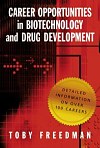 According to Toby Freedman, a university life “generally does not prepare individuals for careers in industry”. On the other hand, news this week that a freshman physics class just launched their own company, suggests he might on occasion be wrong. Nevertheless, an academic training is not entirely compatible with a move to the harsh realities of the commercial world and Freedman, who does hold a PhD, which she obtained from the University of North Carolina at Chapel Hill, and has written a book to help life scientists make the transition.
According to Toby Freedman, a university life “generally does not prepare individuals for careers in industry”. On the other hand, news this week that a freshman physics class just launched their own company, suggests he might on occasion be wrong. Nevertheless, an academic training is not entirely compatible with a move to the harsh realities of the commercial world and Freedman, who does hold a PhD, which she obtained from the University of North Carolina at Chapel Hill, and has written a book to help life scientists make the transition.
Career Opportunities in Biotechnology and Drug Development provides a detailed overview of more than 100 careers in the life sciences industry, advice on carrying out a targeted job search, and useful guidance on making the leap from the ivory tower into the commercial lab or non-academic work environment. Of course, I use the phrase “ivory tower” with my tongue firmly implanted in my cheek, given the often equally cutthroat environment in which contract research associates work in academia.
Freedman writes from experience as a scientist who transitioned into business as a writer, recruiter, and entrepreneur, and recently launched a life sciences recruiting firm, Synapsis Search, which pairs job candidates with companies.
From the book’s blurb: “Topics cover 20 vocational areas, including research and development, regulatory and medical affairs, sales and marketing, business development, information management, law, executive leadership, consulting, recruiting, and finance. Each chapter includes a discussion of job security, future trends, and potential career paths; specific educational requirements and personality characteristics needed to excel in a chosen profession; recommendations of books, magazines, and Web site resources; and issues to consider regarding salary and compensation.”